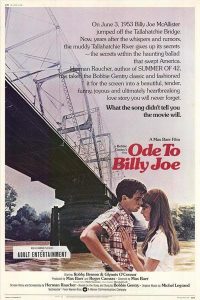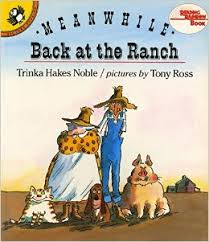SHORT TAKE: The solution to the mystery behind the lyrics to the song "Ode to Billie Joe".
LONG TAKE: The lyrics from “Ode to Billie Joe” have always puzzled me and after five decades of hearing this song I finally know why. And, yes, this subject DOES belong in a movie/theater blog because the mystery behind this song was speculated upon in a movie of the same name in 1976 starring Robbie Benson – the geeky looking kid who shocked audiences when it was discovered he was the one who produced the magnificent and overpowering Disney Beast voice in the original ANIMATED Beauty and the Beast.  The movie Ode to Billie Joe was…….interesting.
The movie Ode to Billie Joe was…….interesting. 
Not one I’d necessarily recommend you rush out and see but not terrible. But neither is it terribly relevant to this blog so leave that for another day.
If you’ve never heard the song it is worth taking the time to listen.
50 years ago today, on July 10, 1967, "Ode to Billie Joe" made it to the airwaves. It is a haunting, melancholy folk song by Bobby Gentry sung with only a guitar as accompaniment with a bit of violin to occasionally sweeten the background. If you want to listen, it is here.

She paints the picture of a small quiet Southern town and the family she grew up with, having breakfast one early summer morning:
It was the 3rd of June,
Another sleepy dusty Delta day…
As she goes on to describe this unnamed town, you feel it is the kind of place in which the children’s book,  Meanwhile Back at the Ranch, could have been set. In the children’s book a farmer goes into town, and while his wife experiences incredible adventures visited upon their doorstep, the most exciting thing that happens to him while in town is to watch a turtle cross Main Street. That kind of town.
Meanwhile Back at the Ranch, could have been set. In the children’s book a farmer goes into town, and while his wife experiences incredible adventures visited upon their doorstep, the most exciting thing that happens to him while in town is to watch a turtle cross Main Street. That kind of town.
In the Bobby Gentry song, however, a more sombre tone is set as the family shares mild town gossip then the Mom casually mentions that:
And now Billy Joe MacAllister's jumped off the Tallahatchie Bridge.
Then the father notes:
Well, Billy Joe never had a lick of sense; pass the biscuits, please.
This comment might rise to the level of casual cruelty except that her father doesn’t seem to have the slightest idea his comments have had any effect at all on anyone at the table, much less his stricken daughter. No one notices the effect this bit of tragedy has had on her. In a brilliant piece of writing, the narrator’s response is not expressed but noted in the next stanza by the mother’s laconic observation that:
… child, what's happened to your appetite?
I've been cookin' all morning, and you haven't touched a single bite
And then the family goes on to discuss more gossip including how the new preacher:
…saw a girl that looked a lot like you up on Choctaw Ridge
And she and Billy Joe was throwing somethin' off the Tallahatchie Bridge.
But no one ever follows up on that bit of news.
I have always had a fascination with this song. The reason for the boy’s apparent suicide is never explained. Neither is the narrator’s connection, except for her subdued but profound reaction to the news as noted obliquely by her mother.
When asked, Bobby Gentry herself said she did not know why Billie Joe MacAllister leapt to his death from the Bridge, nor even if it was a suicide. And then I read an article the other day which brought some clarity to the issue. The song is not ABOUT Billie Joe MacAlister. It is about the detached, casual, almost cruel way the family brings it up and the fact that they do not notice their daughter/sister’s obvious and deep distress.
No one in her family registers that maybe she was even in love with the young man, although total strangers – we the audience – notice with the dismay that comes from watching someone collapse in grief from a distance which precludes our ability to do anything about it. We, who’d never even heard of this young woman until listening to this song, see and understand what her closest family members do not. And that’s what the real tragedy is about.
In the very next stanza the narrator sings casually about how her brother and Becky Thompson get married and buy a store in Tupelo. And then, in an almost off-hand manner, the narrator describes how:
There was a virus goin’ round and Papa caught it and he died last Spring.
And now Mama doesn’t seem to want to do much of anything.
In an almost “turn about is fair play” callousness, the recent death of her own father elicits an observation no more heart felt than her subsequent observation that her mother seems to have lost her enthusiasm for activities which she, presumably was once interested, echoing the detachment her father, in turn, had expressed about Billie Joe's death. The narrator describes the catastrophic death of her father with the same consternation one might have in noticing that after losing a pie contest her mother was no longer interested in making pies or equivalent to the loss of the family pooch. Her comment echos her father’s off-hand petty insult upon learning of Billie Joe's death, that Billie Joe: “…never had a lick of sense.” No sympathy. No serious concern. Just an emotional shrug of the shoulders.
For years I thought the song was about Billie Joe, as do, I suspect, most listeners. It is about death, but not Billie Joe’s. I believe the song is about the silencing of this young woman’s bond with her family. And it is a reflection of the alienation many young people of the last several generations have felt towards their parents and siblings. It is about the isolation manufactured, engendered, and cultivated deliberately by today’s society of institutional education, cliques, social media, and the “generation gap” mentality. It is about the indoctrination of the philosophy that one’s significant others must be anyone but one’s family members, repeated by every TV show, movie and song lyrics since the early ‘60's. From not wanting to be seen dropped off by one’s parents, to the Who’s line in the song titled, appropriately enough “My Generation”: “Hope I die before I get old,” it is a reflection of the media endorsed idea that children are not the parent’s business and children should disdain closeness with their family members.
The Baby Boomers of today have grown up and grown old in a world where family ties are supposed to be weak, transitory and superficial – to be easily replaced with the bar hook-up relationship. And "Ode to Billie Joe" was the early epitaph to this unfolding sociological cataclysm.
How could an entire family not notice this young woman's grief? Or care enough to find out her involvement with Billie Joe? Or want to inquire if indeed it was she who had been up on the bridge tossing something off with Billie Joe? And why was she so visibly shaken at the news of his death? No one inquires. No one seems to even care.
Yet the narrator’s response to Billie Joe’s death reflects her mother’s reaction to her father’s death. Instead of finding uplifting comfort within a familial embrace, they both sink into apathy and depression.
Mama doesn’t seem to want to do much of anything.
And me I spend a lot of time pickin’ flowers up on Choctaw Ridge, and throw them into the muddy waters off the Tallahatchie Bridge………………
No one seeks consolation or comfort from the other. The brother moves away. The mother withdraws. The narrator isolates herself.
But this is not a new idea, only one newly re-discovered. Herman Raucher, author of the screenplay for the earlier mentioned movie, Ode to Billie Joe, had interviewed Gentry as part of his research. Gentry stated that the real theme of the song was indifference.
If you watch the video of Bobby Gentry performing this song on the Smothers Brothers Show when the song first came out in 1967, this becomes visually evident. Gentry plays alone with a guitar and in the background, around a table, sits a family of…mannikins. It is a creepy but apropos image.

As a homeschool mom who is profoundly grateful for the Providence with which we were blessed to raise our children with their siblings as their primary friends, who never took “nothing” as an answer to the question “What’s wrong?” and whose husband insisted that all dinners were mandatory attendance for all family members, this is a bullet we dodged by the Grace of God.
The failure of the ‘60's generation society to nuture the family unit has a lot to answer for. Obtusely placed blinders when it comes to staying in tune with one’s children is one of those debts.
I pray God your children never experience the kind of trauma Gentry describes. But they will inevitably experience some kind of trauma. Be sure you notice.

Well, regardless of how you or I were brought up or what our childhood experiences were, this is how Bobby Gentry perceived it. And the tree can be judged by its fruit and the coarsening of our culture, the disparagement of the father's role, the explosion of single mother families, the Holocaust of abortions, the increase in abuse of children, all point to the disrespect and dissolution of the familty planted in the '60's generation gap mentality and cultivated by a progressively selfish baby boomer me-first attitude.
I came across this review late. But I have an axe to grind with the reviewer. There is a tendency to use movies, their stories and her take on them, as a vehicle for pushing her particular Christian agenda, or in this case her 'home-schooling' agenda. It's also unfair and untrue to suggest that Sixties families did not nurture their children, or cherish them or give them good advice. How can the reviewer draw that conclusion. I was brought up in the Sixties, and although our family was not by then church-going, we got sound moral and practical advice and of COURSE meal-times were family times, as were most families. Circumstances and budgets and timings (people coming in from school or work) demanded it. I'd prefer a bit less of what I see as propaganda in these reviews.
Hi, just wanted you to know I have added your site to my Google bookmarks because of your special blog layout. But earnestly, I think your site has one of the cleverest theme I’ve came across. It really helps make reading your blog a lot better.